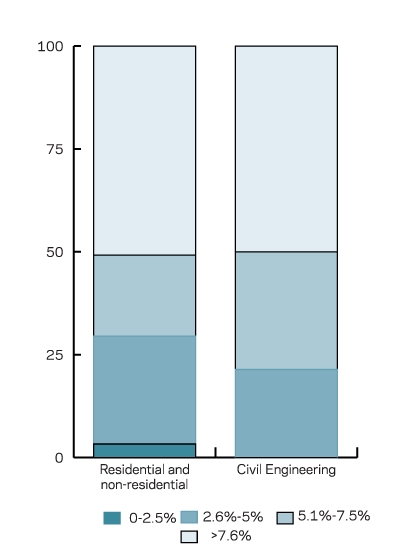The slowdown continues to eat into firms’ workloads and order books, with the activity index for September falling to an all-time low, according to Experian Business Strategies
01 / The state of play
Activity in the industry continues to decelerate, according to the latest Experian Business Strategies monthly survey, with the activity index dropping a further three points to an all-time low of 33. This is the third consecutive monthly decline in the index after a three-month stabilisation period in the middle of the year.
Not surprisingly, construction firms reported insufficient demand as the main activity constraint. Activity is expected to continue to drop over the next quarter, but the small glimmer of light in the darkness is that the rate of decline is likely to slow.
The residential activity index suffered the largest fall in September: it fell six points to 28. Furthermore, the orders index for the sector dropped to 41 and the tender enquiries index remained the lowest of the three sectors at 38.
In contrast, the civil engineering sector’s tender enquiries index rose four points to 40, although this still represents a decline in enquiry levels. The activity index for the sector also rose marginally, by one point to 31. On the downside, the sector’s orders index dropped by 10 points to 37.
For the first time since February 1993, the bulk of respondents expected tender prices to decline over the next three to four months, with the index dropping by six points to 44 in September. Firms also remain pessimistic about employment prospects in the short term with the index at 30, the lowest since June 1991.
02 / Leading construction activity indicator
The Experian Business Strategies’ Leading Activity Indicator predicts that construction activity will continue to contract over the next quarter. However, the decline is expected to slow over the period to December. The Leading Activity Indicator uses a base level of 50; an index above that level indicates an increase in activity, below that a decrease.
03 / Work in hand
All three sectors experienced a significant drop in work-in-hand lasting beyond six months, with the largest fall-off among firms working in the non-residential building sector. However, there was no significant increase in the percentage of firms reporting fewer than three months work in hand, the major change noted in those reporting between three and six months work. So, while on average, 80% of firms reported a maximum of six months work in hand in June, in September this figure had risen to about 88% of respondents. The shortening lengths of work-in-hand are in line with the falling levels of activity and the fact that order books are now on average below normal for the season.

04 / Regional perspective
The regional results painted a varied picture for September. Experian Business Strategies’ regional composite indicators incorporate current activity levels, the state of order books and the number of tender enquiries received by contractors to provide a measure of the relative strength of each regional industry. Indicators fell in seven of the eleven regions between August and September, and remained below 50 in all but two regions - Wales and the North. The South-east saw the strongest fall in its indicator, dropping six points to 41, a record low. Indices for the East Midlands, East Anglia and the North-west also hit record lows, with each falling by three points during September.
The North-west remained the worst performing region in September, with its indicator dropping 3 points to 29, substantially lower than in any other region. The Yorkshire and Humberside indicator rebounded strongly, rising 7 points to 40, which was the highest reading since April. At 60, the indicator for the North was 3 points above the previous month, and continued to show strong growth in the region. The UK overall remained unchanged at 49, showing only a slight contraction for firms working across the country.
Downloads
02 Leading construction activity indicator
Other, Size 0 kb04 Regional perspective
Other, Size 0 kb
Postscript
This is an extract from the monthly Focus survey of construction activity, undertaken by Experian’s Business Strategies division on behalf of the European Commission as part of its suite of harmonised EU business surveys. The full survey results and further information on Experian Business Strategies’ forecasts and services can be obtained by calling 0870-1968 263 or logging on to www.constructionfutures.co.uk
The survey is conducted monthly among 800 firms throughout the UK and the analysis is broken down by size of firm, sector of the industry and region. The results are weighted to reflect the size of respondents. As well as the results published in this extract, all of the monthly topics are available by sector, region and size of firm. In addition, quarterly questions seek information on materials costs, labour costs and work in hand.
























No comments yet